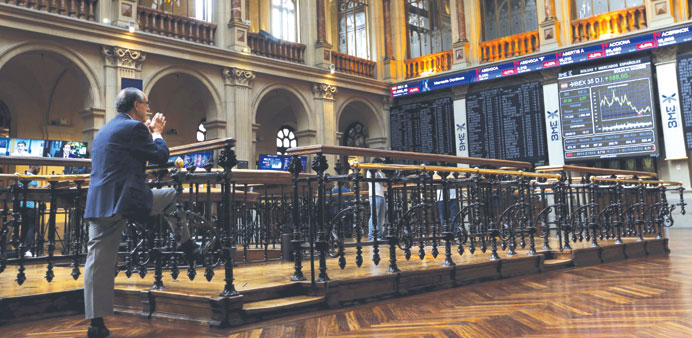A trader gestures as he looks at computer screens at Madrid bourse. European stock markets slid lower yesterday, with southern European banks hit particularly hard, after Greece closed its banks and imposed capital controls.
AFP/London
Global stocks slumped yesterday over fears that Greece may be heading for a eurozone exit, with the single currency area’s debt-laden nations and banking equities hardest hit.
European, Asian and US markets all sagged as Greece’s decision to hold a referendum on austerity conditions demanded by its creditors in exchange for bailout funds increased the possibility of a Greek default and eurozone departure.
Those fears led the euro to tumble below $1.10 in foreign exchange deals before recovering to $1.1177.
In Europe, markets closed in the red, with Frankfurt’s DAX 30 losing 3.56% to 11,083.20 points, the CAC 40 in Paris shedding 3.74% to 4,869.82 points and London’s benchmark FTSE 100 index of top companies falling 1.97% to 6,620.48 points.
But it was eurozone nations with high debt burdens that were hardest hit, with both Lisbon and Milan plunging more than 5% and Madrid slumping 4.56%.
“We’re seeing a flight for safety in financial markets at the start of the week as investors respond to the actions of the Greek government over the weekend that has set in motion a series of events that may ultimately lead to Greece exiting the eurozone,” said Craig Erlam, senior market analyst at Oanda trading group.
“The euro experienced heavy selling... as traders sought the safety of the yen, Swiss franc and gold to protect against the negative fallout from events in Greece.”
The flight to safety was underlined by Swiss central bank chief Thomas Jordan who said the bank was forced to intervene in the foreign exchange market yesterday to hold down the rise in the franc against the euro.
Renewed concern over indebted eurozone members also sent borrowing costs rising for Spain and Italy on international bond markets.
Greek authorities ordered Athens’ stock market shut yesterday, alongside decisions to close the country’s banks for a week and impose capital controls – putting European banks under intense pressure.
Deutsche Bank tumbled 5.81%, Banco Santander plunged 6.70%, BCP sank 11.11%, and Italy’s Monte dei Paschi di Siena (BMPS) lost 10.24%.
The drastic measures to protect Greece’s banking system against the threat of mass panic came after the European Central Bank said it would not increase its financial support to Greek lenders, despite early signs of a bank run.
“Greece’s decision to shut banks over the weekend is just the most dramatic element of a crisis that has spiralled out of control,” said Chris Beauchamp, senior market analyst at traders IG.
The weekend of high drama began with Prime Minister Alexis Tsipras’s unexpected call for a July 5 referendum on creditors’ latest reform proposals after bailout talks in Brussels collapsed.
In response, angry EU and IMF creditors rejected a request to extend the nation’s bailout beyond its today’s expiry date, sparking fears Greece could default on a key debt payment to the IMF due the same day, setting it on a course that could end with it crashing out of the eurozone.
Despite the high drama in the unfolding crisis, however, Berenberg Bank chief economist Holger Schmieding said it does not constitute an unexpected, uncontrollable and history-altering “black swan moment” for Europe and the euro.
“The eurozone has spent the last four years strengthening its defences against contagion risks, and has had ample reason over the last few weeks to ponder ‘what if’ scenarios,” Schmieding said of the European debt crisis that has been contained virtually everywhere but in Greece.
US stocks were also hit, with Dow Jones Industrial Average trading down 1.17% compared to Friday’s close.
The broad-based S&P 500 fell 1.21%, while the tech-rich Nasdaq Composite Index dropped 1.44%.
Adding to the turbulence, Puerto Rico Governor Alejandro Garcia Padilla told The New York Times the US commonwealth is unable to pay its approximately $72bn in debt.

